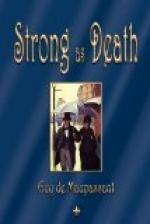Suddenly Rocdiane said: “How are you, Farandal?”
The Marquis entered, his hands on his hips, with the easy air of well-made men, who never feel embarrassed at anything.
“He is a gladiator, that chap!” Landa murmured.
Rocdiane resumed, turning toward Bertin: “Is it true that he is to marry the daughter of your friend?”
“I think so,” said the painter.
But the question, before that man, in that place, gave to Olivier’s heart a frightful shock of despair and revolt. The horror of all the realities he had foreseen appeared to him for a second with such acuteness that he struggled an instant or so against an animal-like desire to fling himself on Farandal.
He arose.
“I am tired,” said he. “I am going to the massage now.”
An Arab was passing.
“Ahmed, are you at liberty?”
“Yes, Monsieur Bertin.”
And he went away quickly in order to avoid shaking hands with Farandal, who was approaching slowly in making the rounds of the Hammam.
He remained barely a quarter of an hour in the large quiet resting-room, in the center of a row of cells containing the beds, with a parterre of African plants and a little fountain in the center. He had a feeling of being pursued, menaced, that the Marquis would join him, and that he should be compelled, with extended hand, to treat him as a friend, when he longed to kill him.
He soon found himself again on the Boulevard, covered with dead leaves. They fell no more, the last ones having been detached by a long blast of wind. Their red and yellow carpet shivered, stirred, undulated from one sidewalk to another, blown by puffs of the rising wind.
Suddenly a sort of roaring noise glided over the roofs, the animal-like sound of a passing tempest, and at the same time a furious gust of wind that seemed to come from the Madeleine swept through the Boulevard.
All the fallen leaves, which appeared to have been waiting for it, rose at its approach. They ran before it, massing themselves, whirling, and rising in spirals up to the tops of the buildings. The wind chased them like a flock, a mad flock that fled before it, flying toward the gates of Paris and the free sky of the suburbs. And when the great cloud of leaves and dust had disappeared on the heights of the Quartier Malesherbes, the sidewalks and roads remained bare, strangely clean and swept.
Bertin was thinking: “What will become of me? What shall I do? Where shall I go?” And he returned home, unable to think of anything.
A news-stand attracted his eye. He bought seven or eight newspapers, hoping that he might find in them something to read for an hour or two.
“I will breakfast here,” said he, as he entered, and went up to his studio.
But as he sat down he felt that he could not stay there, for throughout his body surged the excitement of an angry beast.




